|
¡@ |
Category / Our
Community /
Project's
Summary /
Computers and
Internet
Problems Overcome /
Sound Bite
1. Category:
Local Specialties.
2. Description of "Our Community":
Jiancing
Village is located in the center of Wanrung, Hualien County,
with Silin Village in the north, Wanrung Village in the
south, Nanping Village, Fenglin Township in the east, and
Central Mountain Range in the west. Jiancing Village is the
smallest village in the township where residents are
unsophisticated and hospitable. Approximately more than 90%
of the residents in the village are Truku people. The Truku
people are now highly populated in Sioulin Township and
Wanrung Township in Hualien County, and a few of them reside
in other villages, Lishan Village in Chuosi Township and
three villages in Jian Township ¡V Chingfeng, Nanhua, and
Fusing.
In terms of the labor
structure in Jiancing Community, most of the residents
engage in agricultural, industrial, and service industries.
There is no specific industrial operation in the community,
and the labor forces have to look for working opportunities
outside the community. As a result, the family functions in
the community are incomplete, resulting in many educational
problems and the population¡¦s sense of loss. Therefore, the
role and status of our school are particularly important. In
addition to taking into account the physical and
psychological development of children in the community, our
school should also attach importance to the thematic courses
of local culture and cooperate with private and government
units, in order to systemically preserve the culture of
Truku people.
Our school established a
cultural club to explore and investigate the culture, and
the research projects of many themes have been completed and
published, including Truku weaving, Truku rituals, Truku
hunting, and Truku facial tattoo. Our school instructs
students in basic academic abilities through education
process, which also enables them to indirectly obtain
abundant cultural intelligence.[up]
3.
Summary
of Our Project:
This project introduced the
cuisine culture of Truku people and conveyed the Truku
culture through the sharing of respondents and the text or
image records of the knowledge and cooking skills of Truku
cuisine culture.
The food culture of Truku
people is simple and environmental-friendly. They can live
on the ecosystem nurtured by the nature. Briefly speaking,
they will use any ingredient in their living environment to
cook food. In the past, they lived a self-sufficient life
without intentionally hunting a large number of animals or
collecting excessive amount of wild vegetables and fruits.
It is their common belief to obey the ecological laws of
Nature.
In recent years, because
in-depth tourism and healthy food are quite popular in
Taiwan, Truku people have started to think about how to
bring tourism into their tribe. With the assistance from
public departments and enthusiasts in the tribe, the
cultural ecology and industry of the tribe have been
activated and put into marketing. Although there isn¡¦t any
natural and ecological landscape in Jiancing Village and its
economic value of sporadic industries is limited, there are
diversified cultural ecology and valuable industries in the
areas where the Truku people reside.
This year, our school selected
traditional cuisine of the tribe as the research theme to
provide courses where students can experience local cuisines
and to conduct interviews. The sharing of female community
volunteers and the person in charge of local cuisine enabled
all the students to understand the traditional food in the
past and creative cuisines in modern days. Moreover, the
introduction to the tribe¡¦s cuisine restaurants also enabled
them to better understand the history and ecological
landscape. More importantly, all the text or image records
were transformed into knowledge and posted on the
information platform to be shared with the world. More
people can understand the cultural insights into Truku
people from the perspectives of conveyance, respect,
education and affection.[up]
4. Our Computers
and Internet Access:
Our school supports wireless Internet access, and
the computer classroom is equipped with high speed
fiber broadband. In Taiwan, which is now a country
with advanced information technology, most Internet
access problems have been solved. Our school
upgraded the computer information technology
equipment in 2011, and purchased equipment for
interviews, such as video cameras, sound recorders,
and digital cameras. Students have a complete set of
interview tools in groups.
Our school has received outstanding awards in the
Cyberfair for the past few years. One major reform
is to include the Cyberfair project into the school
curriculum planning, which teaches students about
the use of information media, interview skills,
upload of research records, and webpage making in
class sessions. The school has established community
websites at the Ministry of Education and Facebooks,
allowing students groups to upload afterthoughts,
reports, and comments.
By integrating the curriculum, hardware, and
software, the teachers and students can produce
reports and complete assignments for the project
theme, and publish their learning experiences and
afterthoughts. It is difficult to collect data and
organize data during the research process, however,
it is the process of knowledge creation and sharing,
and all of us enjoyed the process.
5. Problems We
Had To Overcome:
(1) Technical
difficulties:
1. Problem: there are
numerous files on the sound recorder and video
camera after the interviews that need to be
transferred to the computer, organized, and
converted. These works require more time than the
class sessions. If these works are regarded as a
part of the curriculum, it is too time-consuming for
the students.
2. Solution: the course
content strengthens the instruction on the use of
video camera, digital camera, and sound recorders,
as well as file transmission. In February, lecturers
have been invited to teach related courses, which
have benefited the students. If these works cannot
be arranged into hands-on courses, the teachers and
students would share the workload. The teachers
would transfer the files to the computer, and
organize and convert the files, whereas the students
are responsible for transcribing the interviews.
(2) Reaching
consensus:
1. Problem: every year,
the Cyberfair project is a presentation of the
research efforts, and the team should face the work
with a positive attitude. The project covers a wide
range of work, including meetings, division of work,
data collection, interview skills, upload of
afterthoughts, operation of information equipment,
organization of digital data, image processing,
webpage making, etc. These works exceed the scope of
regular teaching environment and learning scenarios.
The members of the project team may feel
helplessness and frustration.
2. Solution: the school
has established a teacher organization for research
projects, which integrates the internal and external
manpower, materials, and funding resources. The
organization holds regular work reviews and forums.
Building mental toughness and seeking school
administrative supports are very important. Without
mental toughness, the team members would feel
exhausted, and be unable to finish the works;
without administrative support, the teachers and
students would be working alone, and eventual be
exhausted.
(3) Interview
outlines:
1. Problem: the
interview outlines must match the research theme,
while the theme is determined based on a large
amount of reference materials. Students have
insufficient data collection and organization
ability. Finding answers would be easy for them, but
transforming the data collected into interview
outlines is difficult for them.
2. Solution: the
guidance of the teacher is very important. When
search for information on the Internet, the
information must be read carefully, in order to
ensure that the information matches the research
theme, and facilitate the interviews.
(4) Project
planning:
1. Problem: this is the
fifth time for this school to enter the Cyberfair.
In the past, the director served as the project
head. However, due to the busy schedule of the
director, the project progress fell behind,
especially the report upload time. If the reports
are not made in time, the subsequent reports and
works may not be completely with sufficient time.
2. Solution: in order
to complete this project and maintain the
educational features of this school, besides
establishing teachers¡¦ learning community, we asked
other staffs to serve as the project head, expecting
the project head to lead the research team with a
different leadership style and perspective. The
teacher community has established trust mechanism,
and the teachers took turns to be the project head.
The experienced teachers would also share their
experiences.
(5) Funding:
1. Problem: in the past
years, with the teachers took the students on a
field trip, the teachers had to pay for the
transportation, meals and beverages, insurance,
gifts for the interviewees, and even the interview
tools, which are extra burdens to the teachers.
2. Solution: since this
year, the school has applied to the private
children¡¦s¡¦ welfare organization for subsidies,
which include transportation and fuel costs,
insurance, hourly compensation for the interviewees,
meal and snacks, etc. With the assistance of the
school administrative personnel and private
organization, the teachers of the research team can
focus on the project, without worrying about the
funding.
(6) Language and
expression:
1. Problem: after using
the Mind Map to complete the interview outlines, the
students had problems in questioning the
interviewees during the interviews. The poor
expression would make the interviewees unable to
answer the questions. During the transcribing
process, as the vocabulary of the students is
limited, the transcripts contain many errors, which
causing problems in the subsequent works.
2. Solution: the
teachers served at the interviewees for practice,
and instructions were given afterwards. If the
students still had problems during the actual
interviews, guidance was given immediately, and the
teachers would explain the students¡¦ situations to
the interviewees. The transcripts would be reviewed
and corrected by the teachers.
6. Our Project
Sound Bite:
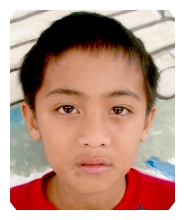
Li-jie Yan |
I
joined the Sinbaiyang Cultural Club because the
teachers would take us to interviews and guide us to
search for information online. We could also eat
delicious foods. It¡¦s very interesting. [up] |
¡@
|
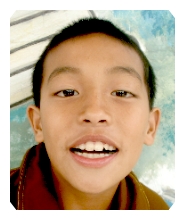
En-yi Guo |
I
really like Sinbaiyang Cultural Club because we
could conduct interviews on traditional cuisines,
and search for information on aboriginal foods.
Before the interviews, the teachers taught us how to
conduct interviews and take pictures. During actual
interviews, we could talk to the restaurant owners
with confidence. I learned a lot here. [up] |
¡@
|

Yu-ching Ma |
I
think Sinbaiyang Cultural Club is really fun because
I could eat lots of delicious foods. All the foods
are so delicious, and that I miss them so much. I
hope I could have the chance to eat these foods
again. [up] |
¡@
|

Hsueh-ke Chiou |
I¡¦m so happy that I could join Sinbaiyang Cultural
Club again. This is my second year. I really like
the club. I didn¡¦t know how to take photos before,
now I know and I enjoy taking photos. My favorite
food is aboriginal food. We went to four
restaurants, and Shang You Farm is my favorite one.
Before we tried each dish, Mr. Doyong would tell us
the story about the food. The foods are great.
[up] |
¡@
|
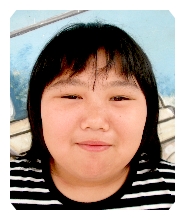
Ting-hsuan Gao |
I¡¦m glad to join Sinbaiyang Cultural Club. I have
been with this club for two years, and I really like
this club because it could expand my knowledge and
take us to where we couldn¡¦t go. The club has shown
me many things I¡¦ve never seen before. I¡¦m very
excited to visit the aboriginal restaurants. One
difficulty agreed by all restaurant owners is that
they need to invent the aboriginal dish with modern
creativity and health orientation. I think it¡¦s very
difficult to operate a restaurant. [up] |
¡@
|

Lan-cheng Chiou |
I
like Sinbaiyang Cultural Club because I got to try
various aboriginal foods, and learn about the
stories behind these foods. We have visited
restaurants, and I am very excited to conduct
interviews. I hope that I could learn more about the
aboriginal foods and try them. [up] |
¡@
|
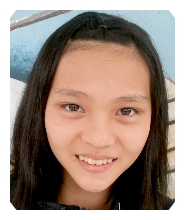
Yu-ting Chiang |
I
joined Sinbaiyang Cultural Club because I need to
improve my typing speed. I also like to learn more
about computers and photography. I really enjoy
taking photos. In Sinbaiyang Cultural Club, I could
participate in the Cyberfair project, conduct
interviews, and try delicious foods, I
like this club. [up] |
¡@
|
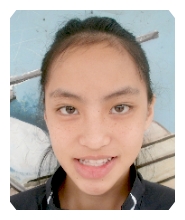
Guan-jie Wu |
I
wanted to learn how to make aboriginal dishes, so I
joined Sinbaiyang Cultural Club and learn so much
about the aboriginal food. At Sinbaiyang Cultural
Club, I have learned so much new knowledge, I¡¦m very
happy. [up] |
¡@

YI-hsuan Lin |
I¡¦m very excited to participate in the Cyberfair
project because I could compete students from other
countries at Cyberfair, and I could win honor for my
school, as well as myself. I hope that our team
could win an award, and that would be a memorable
experience. After all the hard work of data
collection, winning an award would make the efforts
worthwhile. This year¡¦s project theme is aboriginal
food, and I¡¦m very excited because I love aboriginal
food. I believe that I could make this project a
good one. Delicious food is an important part of our
life, and making delicious foods requires full
devotion. [up] |
¡@
|
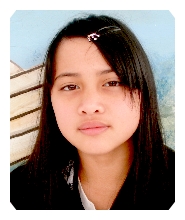
Yu-hsuan Wang |
This is my third time joining the Cyberfair project.
This year¡¦s theme is Truku food. We conducted many
interviews, and tries various genuine aboriginal
food. Each interview is held at a different place,
with a different person and different contents; but
all are interesting. The restaurant owners treated
us with warm welcome and friendliness, and we all
had a good time. The work of organizing the
interviewing data is a difficult job, but I hope
that we could win an award so that our efforts can
be recognized. [up] |
¡@
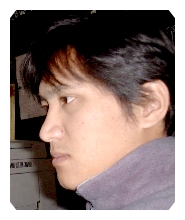
Teacher De-lin Ai |
This year¡¦s Cyberfair project is under the theme of
Truku food. As in the previous years, my objective
of this project is to help the students learning
about their tribal culture. The Cyberfair project
not only could enhance the knowledge base of the
students, but also bring new thoughts to the
traditional culture and modern culture.
The students always find the Cyberfair project
meaningful, with a sense of achievement. For
example, the owner of the Masai Restaurant expressed
her persistence in the Truku food. From the
interview, we learn about the traditional
ingredients and the innovation in modern foods. Mr.
and Mrs. Doyong built a paradise of fine cuisine by
growing various food ingredients that we often heard
but never seen before. Mr. Doyong gave interesting
explanation on the food ingredients, which are
valuable to our research. Mrs. Guo of Dageeli,
despite of the various obstacles, managed to sustain
the business through applications of subsidies and
support from her family. It was regretful that
Hongyeh High-raised House closed down, which showed
that difficulty in managing aboriginal restaurants.
The failure experience is also worth of learning.
The students have cooperated to complete their
tasks, and the learning experience will be memorable
to them. [up]
|
¡@
|
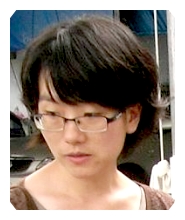
Teacher Shu-jun Hua
¡@ |
¡§Eating is the main composition of life¡¨. Food is
often a subject interested by most people. Since
2005, our school has offered a course on Truku food
every two years. After several years of planning,
this topic has been presented in this year¡¦s
Cyberfair project. I hope that everyone could have a
chance to learn about the Truku cuisines with us.
This year¡¦s project is the best one ever because we
got to taste a variety of food. All the hard works
are worthwhile. [up]
|
¡@
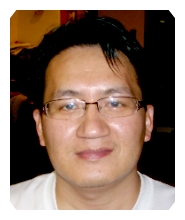
Director Shou-liang Hsu |
Since I have been in the teaching position, I often
accompanied students in performance and field
visits. As the Chinese saying goes, ¡§It is better to
travel far than to read voluminously¡¨. At every
performance or field visit, I see smiles on
students¡¦ faces that I don¡¦t see in school. Field
trips can cultivate good learning atmosphere, and I
enjoy leading the teachers and students to research
trips. I also work my colleagues to design courses,
especially meaning and goal-oriented activities. The
students have learned how to develop interview
outlines, how to conduct interviews, how to operate
equipment (video camera, digital camera), how to
communicate with others, as well as transcribing,
software use, community website management, writing
reports, at Sinbaiyang Cultural Club. I really envy
them having the chance to be exposed to the course
contents that are only offered in university. My
colleagues have encouraged and simulated each other
throughout the course, and I hope that our teaching
competency and students¡¦ learning outcomes could
both be enhanced. [up] |
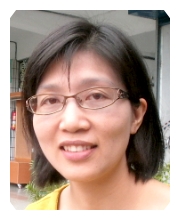
Teacher Ke-yu Chen |
This was just a simple succession of courses
designed for teachers and students to learn and
research together, but in this process of mutual
learning, I once again experienced the value and
uniqueness of cultural heritage. We learned of
tribal plants and prepared them so they became
delicacies on the table, and the inexpressible joy
we felt was not only manifested on the children¡¦s
faces, but evidenced by the fulfillment and
gratefulness we felt in our minds and bodies. I
sincerely hope that this learning process will leave
beautiful, indelible memories for our tribe and our
people. [up] |
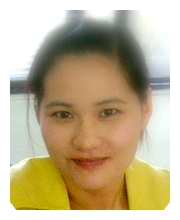
Teacher Xin-yi Li |
Our school has been participating in the Cyberfair
for five years, with the guidance of a team of
outstanding teachers, the students have each year
achieved excellent records, and I am deeply honored
to have joined such an outstanding team in exploring
traditional Truku cuisine. As a member of the Truku
tribe, I am often asked, ¡§How much do you know about
your culture?¡¨ and more often than not I answer with
a smile, because I really am a Truku that knows very
little about my own culture. Since childhood I have
always been taught by my parents to be an obedient
child and student, to learn diligently, and spare my
parents from worry. My parents speak Mandarin
Chinese to me, therefore I am awkward at speaking
our tribal language. As for the ¡§traditional foods¡¨
we researched for our school¡¦s Cyberfair project, I
could only recognize a few dishes out of many, and
it was only because we participated in this project
that I found out the gourmet dishes of our tribe
were, in the past, only available during special
festivities. Through their marketing efforts,
innovations and incessant improvements, restaurants
have finally successfully built names for themselves
and developed menus that truly appeal to tourists
and visitors. I hope that our interviews of these
restaurants may contribute to our continuous efforts
in promoting the cuisine of our traditional culture.
[up] |

Teacher Chen-yuan Li |
When You Close Your Eyes
Take from the mountains, live with the land, that¡¦s
the spirit of a Truku life.
The plants growing along the mountain streams yield
abundant tender shoots that make fresh, green
ingredients. The animals that abound in hills and
valleys provide the tender meat completely free of
PayLean. Prepared in the simplest ways, these
ingredients are made into dishes that elucidate
their superior natural flavors, flavors that linger
both on your tongue and in your mind.
The aboriginal restaurant owners that travel between
townships and villages persevere in preserving
tradition, in promoting their indigenous culture and
heritage, the spirit of which called forth great
respect from the students. By experiencing
traditional culture themselves, students not only
learn of the rich tribal cuisine, how to eat healthy
and be environmentally friendly, but also grow to
hope that more people may also experience and
appreciate the essence of Truku cuisine.
A
gourmand deeply touched by the rich flavors of
tribal cuisine, Chen-yuan [up] |
|
¡@ |

